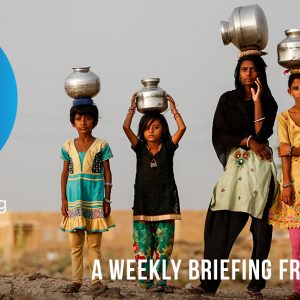Federal Water Tap, September 23: TVA Moves to Safer Coal Ash Storage at Gallatin Plant
The Rundown
In settling a lawsuit, the Tennessee Valley Authority will revamp its coal ash storage at a coal-burning power plant in Tennessee. A water funding bill advances in Congress while a separate measure seeks to establish a revolving fund for disaster preparation. NOAA tracks intense rainfall from Tropical Storm Imelda and proposes an expansion of critical habitat for Southern Resident killer whales. The USDA announces new rules for funding rural infrastructure projects. The Department of Energy seeks comment on designing a prize competition for recovering energy and nutrients from wastewater. The GAO reports on orphaned oil and gas wells. And lastly, the CDC will conduct two health studies: of drinking water quality in private wells and of individuals in Florida exposed to airborne toxins produced by cyanobacteria.
“I have personally visited the sites that we are transferring to the U.S. Army, and there is no question we have a crisis at our southern border. Absent this action, national security and natural resource values will be lost.” — David Bernhardt, the Interior secretary, in a tweet about his decision to transfer the jurisdiction of 560 acres of federally managed land to the Army for construction of some 70 linear miles of barriers on the border with Mexico. Bernhardt did not mention concerns held by conservation groups that construction of the barriers puts ecosystems at risk, including Organ Pipe Cactus National Monument, in Arizona. The parcels to be transferred are located in Arizona, California, and New Mexico.
By the Numbers
43.4 inches: Estimated maximum rainfall, in western Jefferson County, Texas, from Tropical Storm Imelda. (NOAA)
15,626 square miles: Proposed expansion of critical habitat for Southern Resident killer whales, a group that is listed as endangered. The last official census, in 2018, counted 75 whales in the group. Since then there have been two births and four whales are presumed dead. The designated waters, which are where the whales spend the winter months and feed, stretch from the Canadian border south to Point Sur, California. A decline in salmon populations, a main food source, is a significant pressure on the whales’ survival. (National Marine Fisheries Service)
In context: Speaking of Water with Janis Searles Jones, CEO of the Ocean Conservancy
News Briefs
TVA Moves to Safer Coal Ash Disposal
The Tennessee Valley Authority, which provides electric power for about 10 million people in seven southeastern states, is working on two fronts to address a legacy of coal ash pollution at Gallatin power plant, a coal-burning facility in Tennessee.
One is a settlement agreement with state regulators and two environmental groups over coal ash disposal. Under that agreement, the TVA will excavate about 12 million tons of ash stored in ponds around the facility, which is located next to the Cumberland River. The ash, which will be stored dry, will be moved to on-site landfills that are lined to prevent leaching of chemicals into the river and groundwater. The authority’s preliminary estimate is that the project will cost $650 million.
The second action is an environmental review for managing Gallatin’s wastewater.
“The NEPA document” — which is the environmental review — “is about how we handle current and future ash,” Scott Brooks, a TVA spokesperson, told Circle of Blue. “The settlement is how to dispose of what has been on site since the 1970s.”
Public comments on the environmental review are being accepted through October 9. They can be submitted to arfarless@tva.gov or via www.tva.gov/nepa.
Water Bills in Congress
- Following an endorsement by the Senate, the House passed a bill that allows states to transfer money between two federal loan funds for water infrastructure. One is designated for drinking water projects; the other, for sewer and stormwater. Sen. Cory Booker’s bill allows for transfers between the funds, notably to address lead pipes.
- In a related bill, Rep. Angie Craig (D-MN) wants to create a similar low-interest loan fund for disaster preparation. Her bill, the Resilience Revolving Loan Fund Act, which was reported out of committee, would provide $100 million a year for two years to states and tribes to prepare for drought, wildfire, earthquake, flood, and other hazards. The funds are also authorized to be used for developing new zoning codes and land use plans. It’s called a revolving fund because as loans are repaid, the money is loaned again.
- Rep. Jared Golden (D-ME) introduced a bill to provide $12 billion over five years to reduce exposure to lead. The Lead-Free Future Act allows the money to be used for, among other things, in-home water testing and lead service line replacements.
- The House passed a short-term funding measure that will keep the government operating through November 21. The continuing resolution also extends the federal government’s flood insurance program through the same date.
Rules Change for Rural Utilities Funding
The U.S. Department of Agriculture’s rural development arm will be able to obligate funding for sewer, electric power, broadband, water supply, and other infrastructure projects before the completion of environmental reviews, according to a new department ruling that fulfills President Trump’s order to quicken the pace of construction.
Environmental reviews must still be completed. But the department can commit funding beforehand. Green groups objected to the change, arguing that it might prejudice the options that are analyzed in environmental reviews or the outcomes. The department responded that it believes it will continue to make “unbiased decisions” in the reviews.
Studies and Reports
Cyanotoxin Health Study in Florida
The CDC is recruiting fishing guides and others who work on Florida’s Lake Okeechobee to participate in a study to measure the health effects of airborne toxins like microcystin that are produced by cyanobacteria.
Researchers aim to recruit 50 volunteers for the study. Lake Okeechobee has a history of cyanobacteria outbreaks, also known as harmful algal blooms.
Private Well Study
The CDC also plans to investigate drinking water quality from private wells. To gauge health risks, researchers will request water samples as well as urine or blood samples from some 200 individuals in roughly 10 locations per year.
BLM Bonds for Oil and Gas Well Reclamation
The value of bonds held by the Bureau of Land Management to clean up old oil and gas wells declined in value, on a per-well basis, according to an audit by the Government Accountability Office. The decline was 3.9 percent. The total value of bonds increased, but the number of wells increased faster.
Wells that are not properly plugged can leak methane into groundwater or surface water. Energy and mining companies, before cracking open the ground, are supposed to post bonds that will cover the cost of rehabilitation after operations cease. In reality, many wells are “orphaned,” meaning there are no funds to pay for their cleanup.
“Bonds are not sufficient to prevent orphaned wells in part because they do not reflect full reclamation costs for the wells they cover,” the GAO report states.
On the Radar
Wastewater Prize Design
The Department of Energy is soliciting public comments on designing a prize competition for improving the efficiency of wastewater treatment by generating energy or nutrients that can be used for heating or fertilizer.
Submit comments by October 23 to WaterResourceRecoveryPrize@ee.doe.gov.
Committee Hearings
- The Senate Energy and Natural Resources Committee will mark up legislation on September 25. Bills to be considered include pumped storage hydropower, a rural water supply project in Montana, species recovery on the Platte River, aquifer recharge, and Bureau of Reclamation reservoir management.
- The House Budget Committee will discuss opportunities for federal infrastructure investment on September 25.
Federal Water Tap is a weekly digest spotting trends in U.S. government water policy. To get more water news, follow Circle of Blue on Twitter and sign up for our newsletter.
Brett writes about agriculture, energy, infrastructure, and the politics and economics of water in the United States. He also writes the Federal Water Tap, Circle of Blue’s weekly digest of U.S. government water news. He is the winner of two Society of Environmental Journalists reporting awards, one of the top honors in American environmental journalism: first place for explanatory reporting for a series on septic system pollution in the United States(2016) and third place for beat reporting in a small market (2014). He received the Sierra Club’s Distinguished Service Award in 2018. Brett lives in Seattle, where he hikes the mountains and bakes pies. Contact Brett Walton






Leave a Reply
Want to join the discussion?Feel free to contribute!